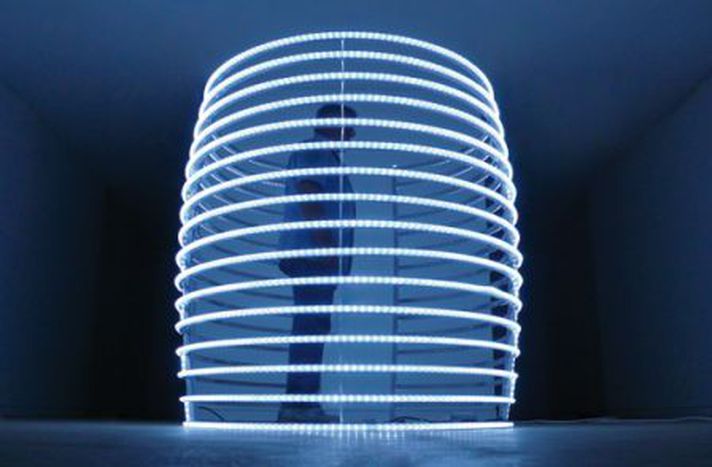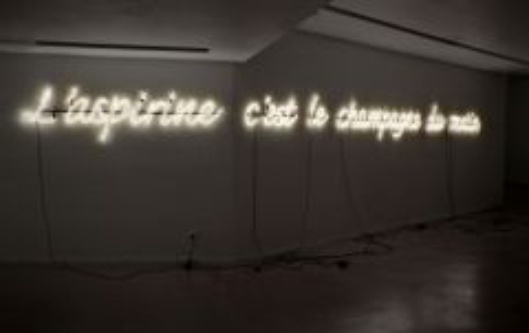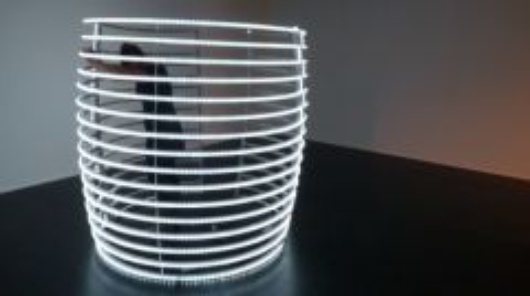
The Exhibition of Jeanne Susplugas, a Mind-Itching Observation on the Human Condition
Published on
By Angélique Berhault. Addiction. Fun. Alienation. Space. Loneliness. Light. By stepping into the contemplative work of Jeanne Susplugas currently displayed at the Charles de Jonghe Contemporary Gallery, these words might pop into your mind.
With a blend of humour, melancholy and beauty, the French artist expresses her neutral observations of the human condition, underlining that in one way or another, our lives are guided by loneliness and self created alienations. To escape our alienations, we often fall into addiction and self-destruction.
For Jeanne, there are daily rituals from which escape is difficult. In the morning you eat and drink out of hunger and thirst, take a shower for reasons of hygiene, think about a thousand things while quickly picking up your keys, your mobile, your cigarettes and anything else you’ll need to have around during the day. And when you think about it twice, these daily rituals are full of alienation. Shall we decide not to live a life constrained by these rituals anymore? Would deciding or neglecting to shave be of any help? These rituals are like comfortable houses. You build your house to feel secure, and yet you can’t escape from it. In your own house, created as a soft cocoon, you might end up living in a violent space. You could meet somebody, recreate an entity, a space, in which you feel good, move in with this person. And suddenly you see yourself drifting into violence, fear or anger. You could develop an illness that compels you to constantly and compulsively clean your house; leading you into the opposite of your initial wishful thinking by alienating yourself on purpose.
One of the installations of Jeanne
Susplugas’ exhibition is a 12m long light installation spelling "L'aspirine, c'est le champagne du matin".
Funny, trendy, poetic and sophisticated, this double-edged sword of a sentence
written by Marie Darrieussecq is nonetheless expressing the melancholy of our
common love for ethanol; each sip being equivalent to building a house, a
protective c ocoon where all inhibitions dissolve. While some people take
aspirin every single day, others are unable to begin their day without downing
a cup of coffee. Likewise, according to psychiatry, dementia patients often
describe their own world as being a secure ‘home’, a secret and perfect place
where they feel at peace, while the outside ‘normal’ world is seen as a
threatening place that leaves them feeling insecure, frightened and unhappy. At
the end of the day, isn’t any abstract house (such as these constructed via
mental illness, drug use, alcohol consumption or medicine) just the same as a
concrete house made of walls and roof? You can simply be so locked in both of
them that the difference is indistinguishable.
ocoon where all inhibitions dissolve. While some people take
aspirin every single day, others are unable to begin their day without downing
a cup of coffee. Likewise, according to psychiatry, dementia patients often
describe their own world as being a secure ‘home’, a secret and perfect place
where they feel at peace, while the outside ‘normal’ world is seen as a
threatening place that leaves them feeling insecure, frightened and unhappy. At
the end of the day, isn’t any abstract house (such as these constructed via
mental illness, drug use, alcohol consumption or medicine) just the same as a
concrete house made of walls and roof? You can simply be so locked in both of
them that the difference is indistinguishable.
 Among her installations, Jeanne
presents “The Light House”, an aesthetic and sensuous metaphor of the first
shot of heroin: pure light. Something of an indefinable beauty, power and
truth. A nest of bliss and righteousness. These feelings are represented by the
outside of the installation: beautiful little light bubbles on a spherical
form. However, by walking around the object, you see an entrance at the back,
get inside, and here you go: there is no light anymore, but an uncomfortable
space instead, with wires on the floor, a place empty of beauty, a cage. That
is the addiction of heroin, this desire to go back to this same attractive
space filled with bliss. Some people are addicted to things that make them feel
good, others to things that make them feel terrible. Is escaping addiction of
both desire and aversion the final light?
Among her installations, Jeanne
presents “The Light House”, an aesthetic and sensuous metaphor of the first
shot of heroin: pure light. Something of an indefinable beauty, power and
truth. A nest of bliss and righteousness. These feelings are represented by the
outside of the installation: beautiful little light bubbles on a spherical
form. However, by walking around the object, you see an entrance at the back,
get inside, and here you go: there is no light anymore, but an uncomfortable
space instead, with wires on the floor, a place empty of beauty, a cage. That
is the addiction of heroin, this desire to go back to this same attractive
space filled with bliss. Some people are addicted to things that make them feel
good, others to things that make them feel terrible. Is escaping addiction of
both desire and aversion the final light?
(Interview with Jeanne Susplugas met during the Brussels Art Days on September, 11th, at the Charles de Jonghe Contemporary Gallery. The exhibition will be held until October, 30th)



